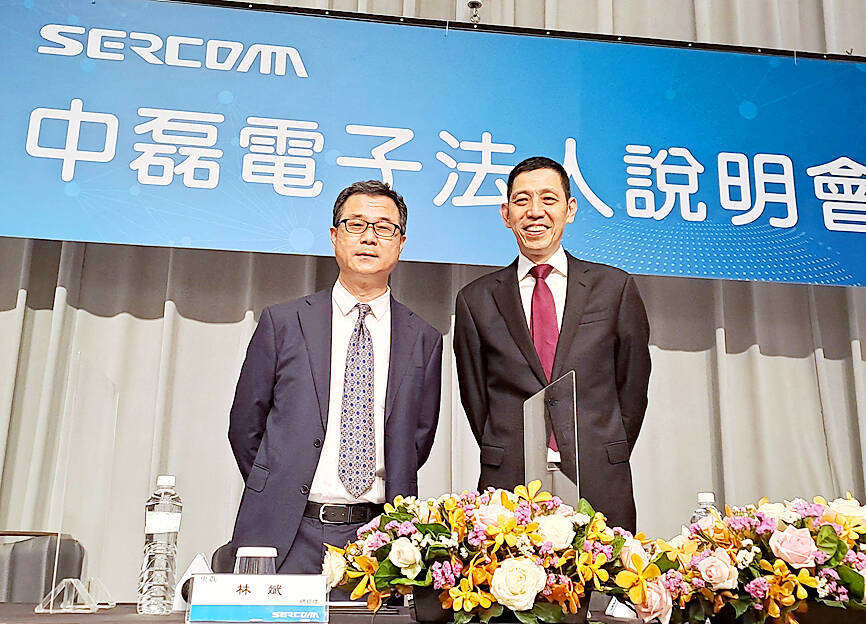Sercomm Corp (中磊) saw its shares rally 1.97 percent yesterday after the broadband equipment supplier gave an upbeat business outlook for next year, expecting robust demand for Internet-connected devices from 5G and Wi-Fi-related devices to fiber-optic products to drive revenue growth.
The Taipei-based company is one of only a few among local electronics firms that expects growth in the post-COVD-19 era, as Internet connection has become indispensable despite the world economy facing greater downside risks due to surging inflation and intensifying geopolitical tensions.
The stock price of Sercomm surged 1.97 percent to the highest level in more than one month at NT$82.7, outperforming the TAIEX, which edged lower 0.04 percent yesterday.

Photo: CNA
“We are looking at healthy and stable growth next year,” company president Ben Lin (林斌) told reporters on Thursday. “Although the overall market demand is in decline, we have developed the right products catering to customers’ demand from certain growing segments.”
The constant technology migration to higher-speed Internet connections through 5G and Wi-Fi-6 technology offers growth opportunities, Sercomm said.
The world’s major economies are injecting massive funds into infrastructure construction including fiber-optic networks to stimulate the economy, which would provide a boon to Sercomm, the company said.
Aside from existing product lines, Sercomm expects to see rapid growth in new demand for television set-top boxes from telecom operators. Sercomm generates about 80 percent of its revenue from supplying broadband devices to telecom operators around the world.
Sercomm has a long order visibility for the next 12 months, but the company is cautiously handling customers’ orders and building chip inventory, as mounting uncertainty about external factors — geopolitical conflict in particular — could cripple demand.
Telecom operators from the EU have axed orders since the second and third quarters, as the economic block has been severely hit by soaring inflation and high energy prices.
However, consistent growth from other areas such as India and Japan have helped offset the losses, Sercomm chairman James Wang (王煒) told reporters on Thursday.
To minimize any impact from geopolitical conflicts, Sercomm has diversified its manufacturing site to the Philippines and is developing a new manufacturing facility in India, the company said.
By next year, the Philippine factory capacity would surpass the company’s factory in China, Wang said.

SEMICONDUCTORS: The German laser and plasma generator company will expand its local services as its specialized offerings support Taiwan’s semiconductor industries Trumpf SE + Co KG, a global leader in supplying laser technology and plasma generators used in chip production, is expanding its investments in Taiwan in an effort to deeply integrate into the global semiconductor supply chain in the pursuit of growth. The company, headquartered in Ditzingen, Germany, has invested significantly in a newly inaugurated regional technical center for plasma generators in Taoyuan, its latest expansion in Taiwan after being engaged in various industries for more than 25 years. The center, the first of its kind Trumpf built outside Germany, aims to serve customers from Taiwan, Japan, Southeast Asia and South Korea,

Nvidia Corp chief executive officer Jensen Huang (黃仁勳) on Monday introduced the company’s latest supercomputer platform, featuring six new chips made by Taiwan Semiconductor Manufacturing Co (TSMC, 台積電), saying that it is now “in full production.” “If Vera Rubin is going to be in time for this year, it must be in production by now, and so, today I can tell you that Vera Rubin is in full production,” Huang said during his keynote speech at CES in Las Vegas. The rollout of six concurrent chips for Vera Rubin — the company’s next-generation artificial intelligence (AI) computing platform — marks a strategic

Gasoline and diesel prices at domestic fuel stations are to fall NT$0.2 per liter this week, down for a second consecutive week, CPC Corp, Taiwan (台灣中油) and Formosa Petrochemical Corp (台塑石化) announced yesterday. Effective today, gasoline prices at CPC and Formosa stations are to drop to NT$26.4, NT$27.9 and NT$29.9 per liter for 92, 95 and 98-octane unleaded gasoline respectively, the companies said in separate statements. The price of premium diesel is to fall to NT$24.8 per liter at CPC stations and NT$24.6 at Formosa pumps, they said. The price adjustments came even as international crude oil prices rose last week, as traders

Taiwan Semiconductor Manufacturing Co (TSMC, 台積電), which supplies advanced chips to Nvidia Corp and Apple Inc, yesterday reported NT$1.046 trillion (US$33.1 billion) in revenue for last quarter, driven by constantly strong demand for artificial intelligence (AI) chips, falling in the upper end of its forecast. Based on TSMC’s financial guidance, revenue would expand about 22 percent sequentially to the range from US$32.2 billion to US$33.4 billion during the final quarter of 2024, it told investors in October last year. Last year in total, revenue jumped 31.61 percent to NT$3.81 trillion, compared with NT$2.89 trillion generated in the year before, according to